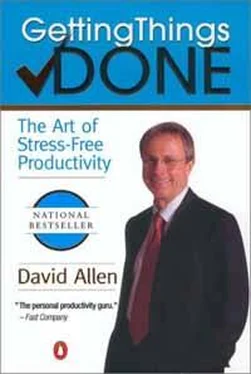There is no reason not to be highly productive, even when you're not in top form.
This is one of the best reasons for having very clean edges to your personal management system: it makes it easy to continue doing productive activity when you're not in top form. If you're in a low-energy mode and your reading material is disorganized, your receipts are all over the place, your filing system is chaotic, and your in-basket is dysfunctional, it just seems like too much work to do to find and organize the tasks at hand; so you simply avoid doing anything at all and then you feel even worse. One of the best ways to increase your energy is to close some of your loops. So always be sure to have some easy loops to close, right at hand.
These first three criteria for choosing action (context, time, and energy) bespeak the need for a complete next-action reminder system. Sometimes you won't be in a mode to do that kind of thinking; it needs to have already been done. If it is, you can operate much more "in your zone" and choose from delineated actions that fit the situation.
Priority
Given the context you're in and the time and energy you have, the obvious next criterion for action choice is relative priority: "Out of all my remaining options, what is the most important thing for me to do?"
"How do I decide my priorities?" is a question I frequently hear from people I'm working with. It springs from their experience of having more on their plate to do than they can comfortably handle. They know that some hard choices have to be made, and that some things may not get done at all.
It is impossible to feel good about your choices unless you are clear about what your work really is.
At the end of the day, in order to feel good about what you didn't get done, you must have made some conscious decisions about your responsibilities, goals, and values. That process invariably includes an often complex interplay with the goals, values, and directions of your organization and of the other significant people in your life, and with the importance of those relationships to you.
The Three fold Model for Evaluating Daily Work
Setting priorities assumes that some things will be more important than others, but important relative to what? In this context, the answer is, to your work—that is, the job you have accepted from yourself and/or from others. This is where the next two frameworks need to be brought to bear in your thinking. They're about defining your work. Keep in mind that though much of this methodology will be within the arena of your professional focus, I'm using "work" in the universal sense, to mean anything you have a commitment to making happen, personally as well as professionally.
These days, daily work activity itself presents a relatively new type of challenge to most professionals, something that it's helpful to understand as we endeavor to build the most productive systems. As I explained earlier, during the course of the workday, at any point in time, you'll be engaged in one of three types of activities:
• Doing predefined work
• Doing work as it shows up
• Defining your work
You may be doing things on your action lists, doing things as they come up, or processing incoming inputs to determine what work that needs to be done, either then or later, from your lists.
This is common sense. But many people let themselves get wrapped around the second activity—dealing with things that show up ad hoc—much too easily, and let the other two slide, to their detriment.
Let's say it's 10:26 A.M. Monday, and you're in your office. You've just ended a half-hour unexpected phone call with a prospective client. You have three pages of scribbled notes from the conversation. There's a meeting scheduled with your staff at eleven, about half an hour from now. You were out late last night with your spouse's parents and are still a little frayed around the edges (you told your father-in-law you'd get back to him about. . . what?). Your assistant just laid six telephone messages in front of you. You have a major strategic-planning session coming up in two days, for which you have yet to formulate your ideas. The oil light in your car came on as you drove to work this morning. And your boss hinted as you passed her earlier in the hall that she'd like your thoughts on the memo she e-mailed you yesterday, before this afternoon's three o'clock meeting.
Are your systems set up to maximally support dealing with this reality, at 10:26 on Monday morning? If you're still keeping things in your head, and if you're still trying to capture only the "critical" stuff on your lists, I suggest that the answer is no.
It is often easier to get wrapped up in the urgent demands of the moment than to deal with your in-basket, e-mail, and the rest of your open loops.
I've noticed that people are actually more comfortable dealing with surprises and crises than they are taking control of processing, organizing, reviewing, and assessing that part of their work that is not as self-evident. It's easy to get sucked into "busy" and "urgent" mode, especially when you have a lot of unprocessed and relatively out-of-control work on your desk, in your e-mail, and on your mind.
In fact, much of our life and work just shows up in the moment, and it usually becomes the priority when it does. It's indeed true for most professionals that the nature of their job requires them to be instantly available to handle new work as it appears in many forms. For instance, you need to pay attention to your boss when he shows up and wants a few minutes of your time. You get a request from a senior executive that suddenly takes precedence over anything else you thought you needed to do today. You find out about a serious problem with fulfilling a major customer's order, and you have to take care of it right away.
These are all understandable judgment calls. But the angst begins to mount when the other actions on your lists are not reviewed and renegotiated by you or between you and everyone else. The constant sacrifices of not doing the work you have defined on your lists can be tolerated only if you know what you're not doing. That requires regular processing of your in-basket (defining your work) and consistent review of complete lists of all your predetermined work.
If choosing to do work that just showed up instead of doing work you predefined is a conscious choice, based on your best call, that's playing the game the best way you can. Most people, how-ever, have major improvements to make in how they clarify, man-age, and renegotiate their total inventory of projects and actions. If you let yourself get caught up in the urgencies of the moment, without feeling comfortable about what you're not dealing with, the result is frustration and anxiety. Too often the stress and lowered effectiveness are blamed on the "surprises." If you know what you're doing, and what you're not doing, surprises are just another opportunity to be creative and excel.
In addition, when the in-basket and the action lists get ignored for too long, random things lying in them tend to surface as emergencies later on, adding more ad hoc work-as-it-shows-up to fuel the fire.
Many people use the inevitablity of an almost infinite stream of immediately evident things to do as a way to avoid the responsibilities of defining their work and managing their total inventory. It's easy to get seduced into not-quite-so-critical stuff that is right at hand, especially if your in-basket and your personal organization are out of control. Too often "managing by wandering around" is an excuse for getting away from amorphous piles of stuff.
This is where the need for knowledge-work athletics really shows up. Most people did not grow up in a world where defining the edges of work and managing huge numbers of open loops were required. But when you've developed the skill and, habits of processing input rapidly into a rigorously defined system, it becomes much easier to trust your judgment calls about the dance of what to do, what to stop doing, and what to do instead.
Читать дальше











